28 Feb 2014 | Digital Freedom, Europe and Central Asia, News and features, Russia

Alexei Navalny addresses a rally (Image: Roma Yandolin/Demotix)
Russian anti-corruption activist and regime critic Aleksei Navalny has been placed under house arrest for two months, against the backdrop of an ongoing investigation against him and his brother for money laundering and embezzlement. He has also been banned from using the internet and talking to the media.
A Moscow court made the ruling following a request from the Russian Investigative Committee, on the basis that Navalny had violated a travel ban by leaving Moscow. Earlier this week, he was sentenced to 7 days in jail for “disobeying police during an unsanctioned public” after taking part in a rally on 24 January day before. He is also currently serving a five-year suspended sentence for theft of 16 million roubles, charges he has insisted are politically motivated.
“I believe the new measures are based on trumped up grounds in order to restrict my political activities,” Navalny said during his hearing.
This article was posted on February 28, 2014 at indexoncensorship.org
28 Feb 2014 | Awards, News and features
The Colectivo Chuchan is a mental health pressure group campaigning to change the treatment of people within Mexico’s mental health institutions.
Members all have ongoing mental health challenges themselves and most have spent time in institutions. Through their work they give a voice and access to freedom of expression to Los Abandonados, the millions of Mexican people who might otherwise be stuck in institutions with no hope of changing their situations.
Nominees: Advocacy | Arts | Digital Activism | Journalism
Join us 20 March 2014 at the Barbican Centre for the Freedom of Expression Awards
The Colectivo works to convince Mexican government to integrate people with psychiatric disabilities back into their communities, rather than institutionalise them. Encouraged by their own experiences, the Colectivo believe this can be achieved if these people are given support. Executive Director Raúl Montoya Santamaría, for instance, has spoken about mental illness and Colectivo Chuchan at events, conferences, universities and on TV and radio in Mexico – bringing important attention to an issue that might otherwise not be covered.
“Meeting the Colectivo Chuchan had a profound effect on me and they helped to breakdown a lot of my ignorance of psychiatric disability. Their battle to change the attitudes of a nation will be long and arduous; most of them may not be alive to see the transformation. Some of them risk damaging their own mental health for this cause, but they see the human rights of people with psychiatric disabilities as something worth fighting for,” said Ade Apitan, presenter for an Unreported World team covering the tragedy of Mexico’s mental institutions.
This article was originally posted on February 28, 2014 at indexoncensorship.org
Due to an factual error in the original video, it was replaced by a corrected version on 10 March 2014 at 2.47pm
28 Feb 2014 | India, News and features, Religion and Culture
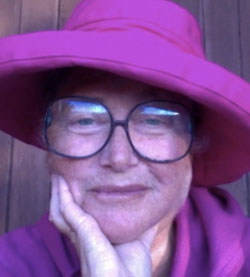
(Image: University of Chicago)
Omair Ahmad, author of ‘Jimmy the Terrorist’ and ‘The Storyteller’s Tale’ has written to his publisher, Penguin India, to cancel his contracts so that he does not feel hypocritical criticizing them. Ahmad’s statement follows closely behind a strongly worded letter by author and Booker Prize winner Arundhati Roy, who asked, “You must tell us what happened. What terrified you?”
The reactions by Ahmad, Roy and other Indian authors and columnists have been prompted by Penguin India’s decision to pulp all remaining copies of American author Wendy Doniger’s controversial book – The Hindus: An Alternative History. This decision came after pressure put on the publisher from a lawsuit filed in 2010 by Hindu group Shiksha Bachao Andolan Committee (The Movement to Save Education) which claimed the book contained heresies and factual inaccuracies.
For its part, Penguin India claimed that it settled the four-year suit in part due to the Indian Penal Code that makes it “increasingly difficult for any Indian publisher to uphold international standards of free expression.” It went onto cite section 295A which threatens up to three years imprisonment against those who “with deliberate and malicious intention of outraging the religious feelings of any class of citizens in India, by words, either spoken or written … insults or attempts to insult the religion or the religious beliefs of that class.” International copies of the book are still available. And, predictably, the book can be illegally downloaded over the internet.
Reactions in India have been mixed. There are those who support Penguin’s decision, as there is a worry that the book places forward a highly sexually charged version of Hinduism, offensive to many devout Hindus. Offensive enough for a group to move the Court against such a book, as is their legal right. However, what has shocked many is that Penguin succumbed to pressure to remove the book from the Indian market without their even being a court order forcing them to do so. As a reaction, the Bangalore based Alternative Law Forum has issued a legal notice to Penguin India claiming the publisher has violated freedom of speech laws and its readers’ rights. The Hindustan Times carried an article criticizing Chiki Sarkar, the publisher of Penguin India, for not keeping her word of October 2012 to “take the next injunction we are faced with and really fight it out.” This, to many, is just another case of self-censorship by so-called liberals because of pressure from right-wing fringe groups who “morally police” Indian society. This is indeed a rising trend in India, as is evident by the growing numbers of reports in the news highlighting cases of exhibitions being cancelled and more famously, stopping authors like Salman Rushdie to appear at literary book festivals.
In a passionate editorial, commentator Pratap Bhanu Mehta has hit out at liberals, so called defenders of free speech for failing themselves. As he writes: “Liberal India has been silenced because it never understood that toleration does not, to use Govind Ranade’s phrase, come in halves. You cannot pick and choose when to be tolerant. You cannot choose to be tolerant along partisan lines. Neither can you choose to be tolerant based on what you think are distinctions between good and bad scholarship, serious and scurrilous books. These distinctions are a good basis for criticism; they are not the best basis for deciding whom the law will protect. And R.V. Bhasin, author of a banned book on Islam, will be protected as much as Wendy Doniger. And so it should be. If you want a hundred flowers to bloom, a few weeds will grow as well.”
Bhanu is right. Attacks on freedom of speech aren’t always prompted only by religious groups. It was only in January 2014 that the media reported that ex-bureaucrat Jintender Bhargava’s book India’s national airline, Air India, was being withdrawn by publisher Bloomsbury, with leftover stocks being destroyed, as well as an apology to former civil aviation minister Praful Patel, who has been pilloried in the book as the man who caused the downfall of the airline. Bhargava found that television discussions about his book were cancelled for reasons unknown to him, and despite an ensuing legal battle – ex-minister Patel has filed defamation cases against him which are yet to be settled — the publisher chose to settle the matter with Patel.
In an article on the matter, Medianama reported that the author, Bhargava, chose to keep the rights of the book for himself and is now looking for another publisher or to release the book online. This, the site reports, is possibly “a sign of things to come.”
Could this also be yet another sign of things to come: What it is now being described as the phenomenon of “libel chill” in India. This means using money to start libel suits the moment someone criticizes them. The Hoot reports of yet another case towards the end of 2013, where giant group Sahara India filed a case against Tamal Bandopadhyay, journalist and author and his publisher Jaico India, for damages of a whopping Rs 2 billion and a perpetual injunction restraining them from publishing or circulating or releasing the book, Sahara : The Untold $tory, in any form.
In these cases, what is the role of the publisher? Can Penguin India be held to a higher standard – one that would involve years of costly litigation – or can they be forgiven for taking a business decision that means they give up on their authors who are left to fend for themselves? Should writers of sensitive subjects look to retaining the rights to their books lest they need a new publisher, or explore digital publishing because the trend seems to indicate publishers might not wait for a court order to stop publishing certain books.
The final answer, then perhaps, lies in the solving of “blatant abuse of libel and defamation laws by corporations and individuals in positions of power, to silence critical voices”, as described by Gautam Bhatia in Outlook magazine. He offers a solution: In the interest of free speech the court must protect journalists and authors who do not wilfully or with reckless regard publish what they know to be wrong. As he writes, “it is possible that the pendulum will swing the other way, and the threat of an unrestrained and irresponsible media can never be discounted… undesirable though the prospect of an unaccountable media is, the prospect of a silenced media is far worse.”
The courts must stand up for freedom of expression in India, and publishers and authors need to know that principles of free speech are worth fighting for, and self-censorship isn’t the new order of business. It is absolutely no coincidence that India has been ranked among the worst countries (140 of 180 countries) on the World Press Freedom Index in 2014.
This article was published on 28 February 2014 at indexoncensorship.org
27 Feb 2014 | Egypt, Europe and Central Asia, Middle East and North Africa, News and features, United Kingdom
Comedian Andy Parsons and Channel 4 chief correspondent and presenter Alex Thomson were among the people gathered at Trafalgar Square today, in support of Al Jazeera journalists facing trial in Egypt on terror charges. Sue Turton, an Al Jazeera reporter who is accused of the same charge, was also present . The crowd staged a silent protest by taping their mouths shut and releasing black balloons.
The protest was part of a global day of action, where people around the world were asked to, at midday, cover their mouths, take a photo of themselves and post it online under the hashtag #FreeAJStaff.
Twenty journalists have been charged with “fabricating news and assisting or belonging to a terror cell”. Eight are in custody, including Al Jazeera’s Peter Greste, Mohamed Fadel Fahmy and Baher Mohamed. They have been imprisoned since 29 December and were last in court on 21 January, where they declared: “We are strong and we shall walk free”. The trial has been adjourned until 5 March.
Images from the protest below.
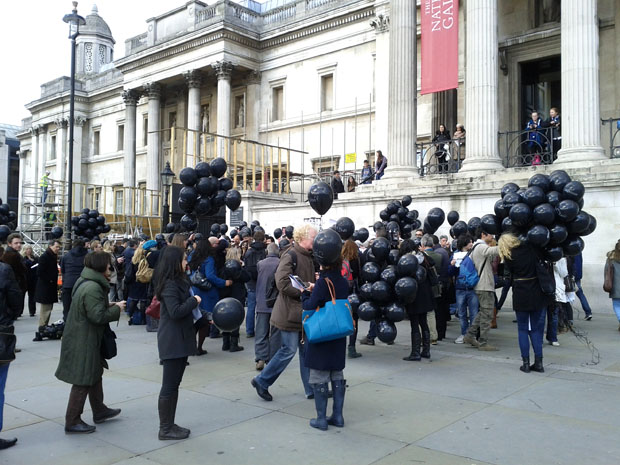
(Image: Index on Censorship)
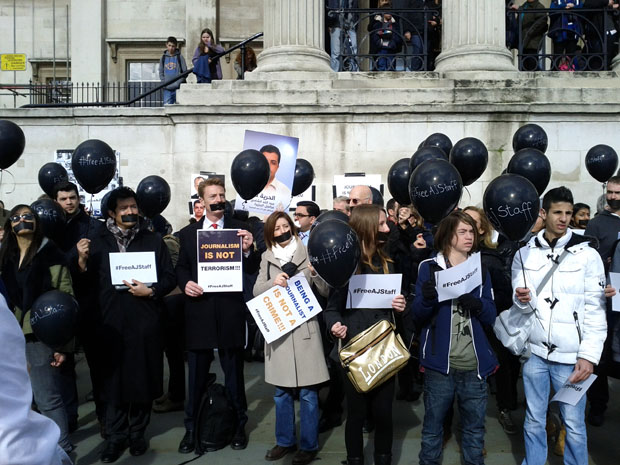
(Image: Index on Censorship)
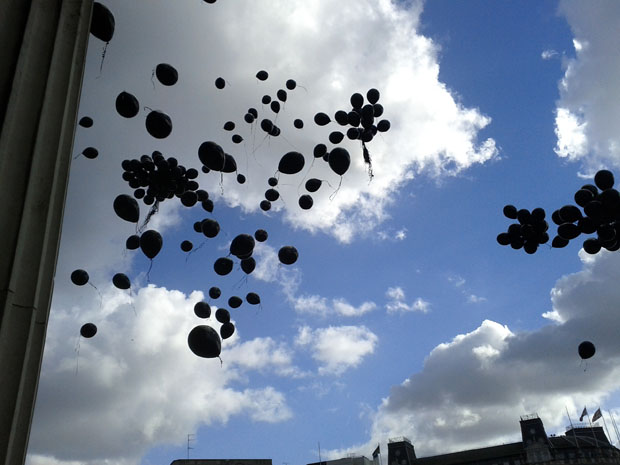
(Image: Index on Censorship)
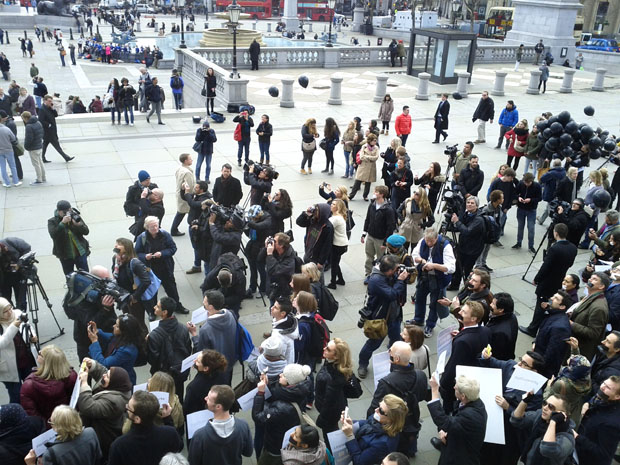
(Image: Index on Censorship)
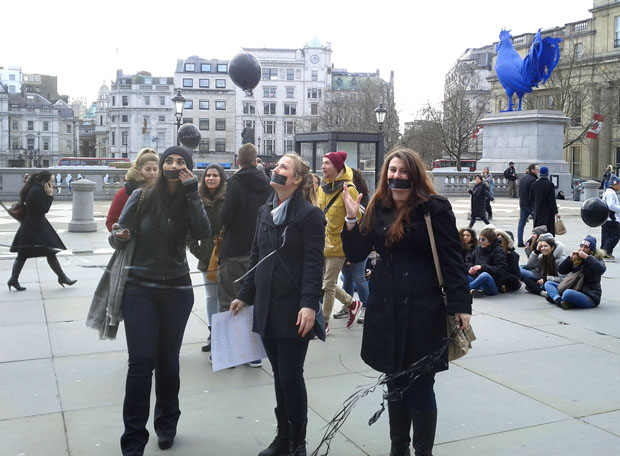
(Image: Index on Censorship)
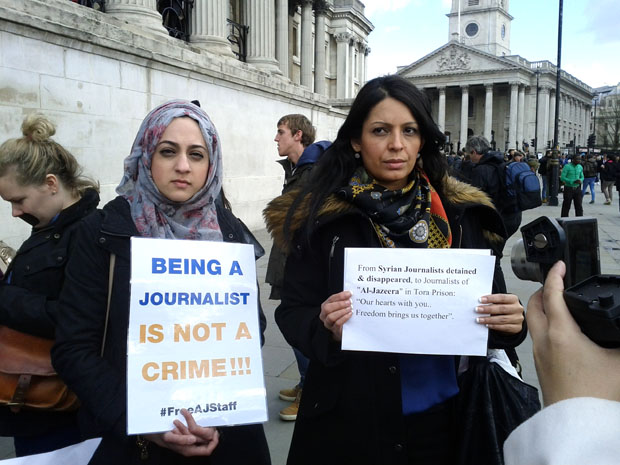
(Image: Index on Censorship)
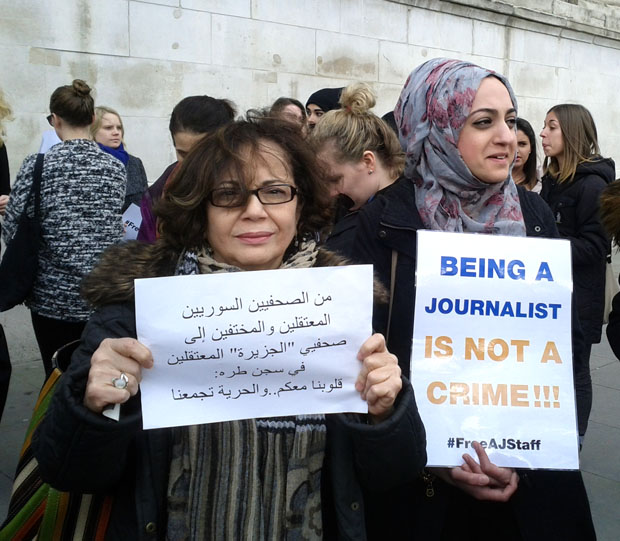
(Image: Index on Censorship)
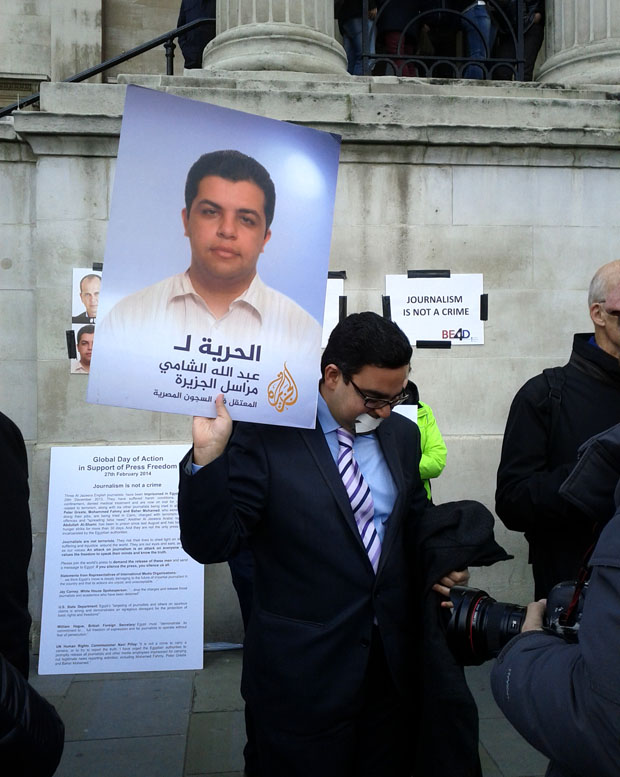
(Image: Index on Censorship)
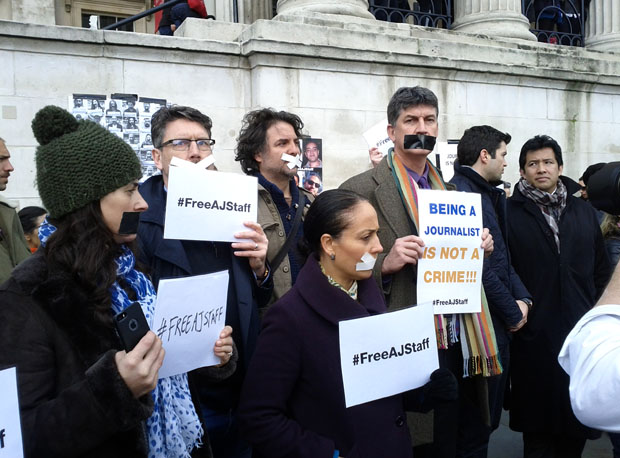
Alex Thomson (Image: Index on Censorship)
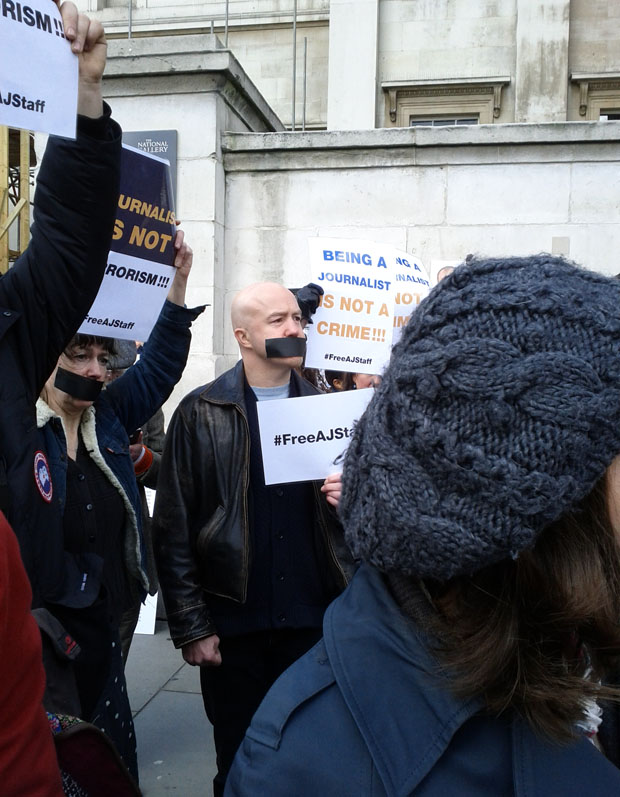
Andy Parsons (Image: Index on Censorship)
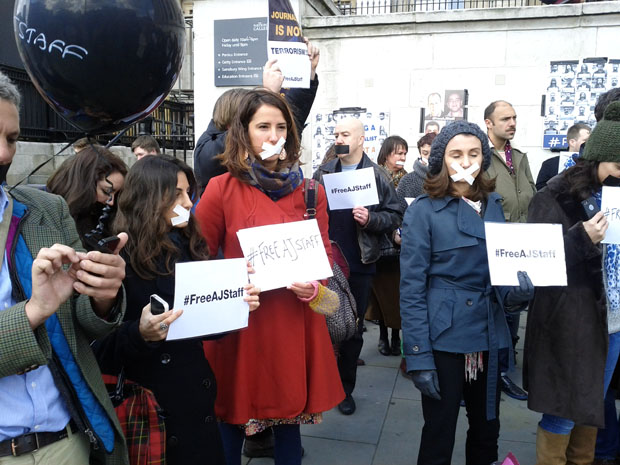
(Image: Index on Censorship)
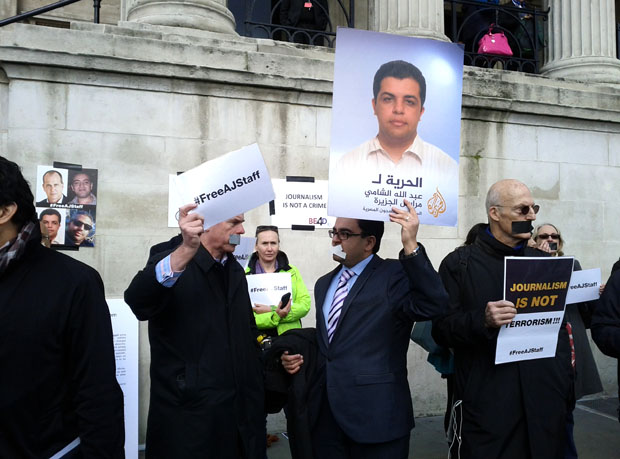
(Image: Index on Censorship)
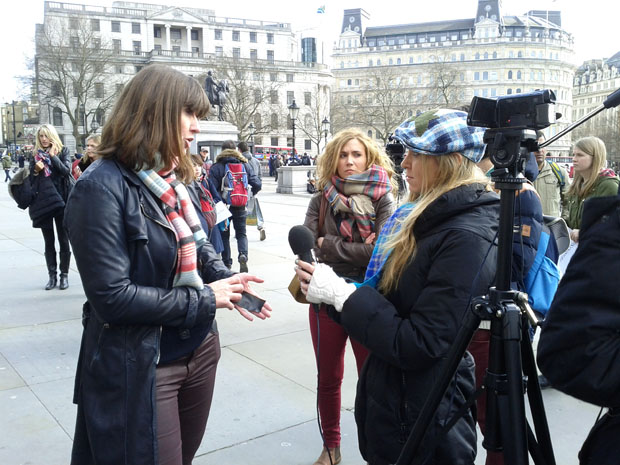
Sue Torton (Image: Index on Censorship)
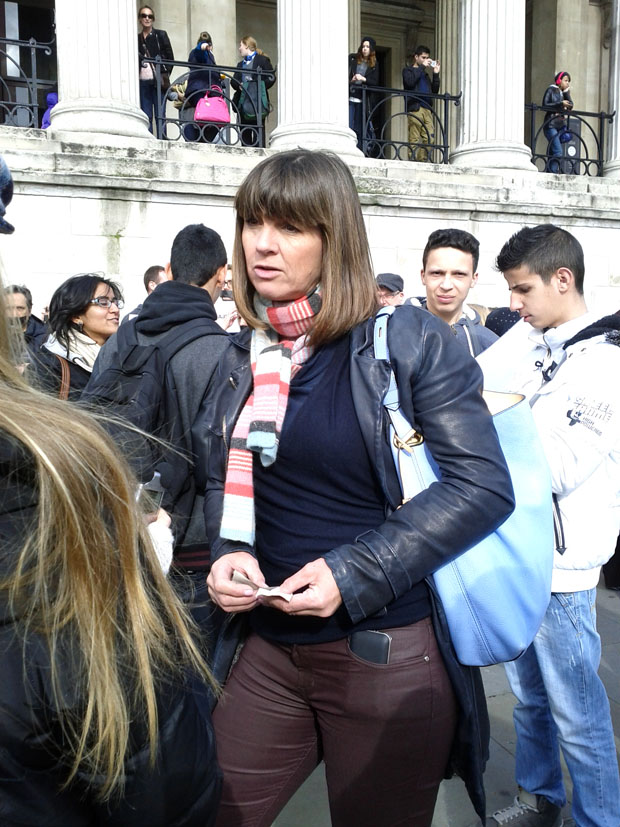
Sue Torton (Image: Index on Censorship)
This article was posted on 21 February 2014 at indexoncensorship.org
















